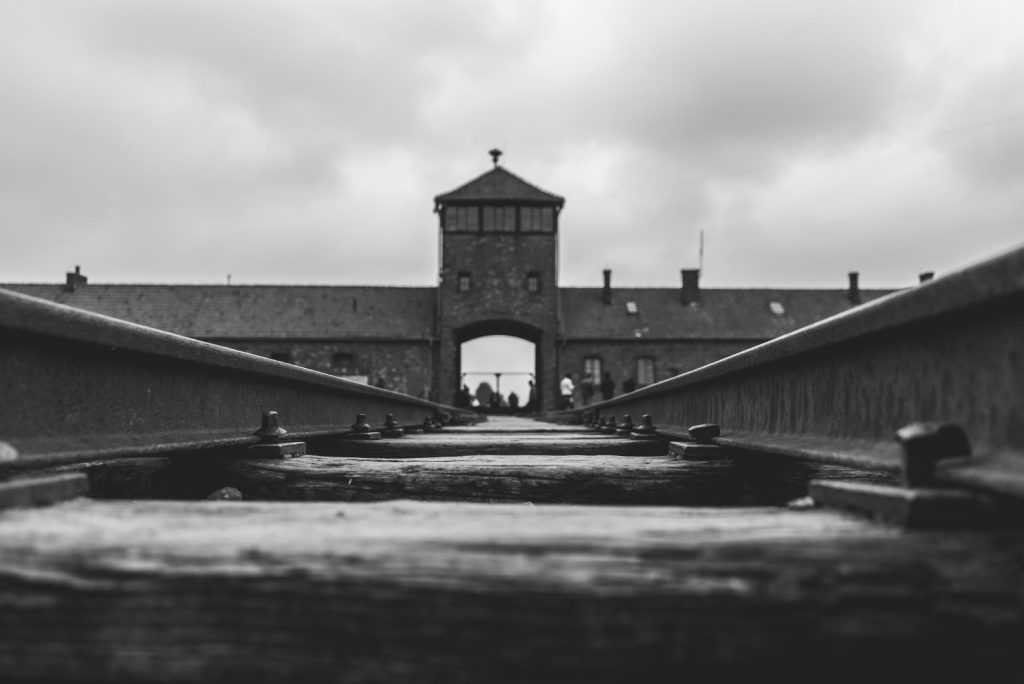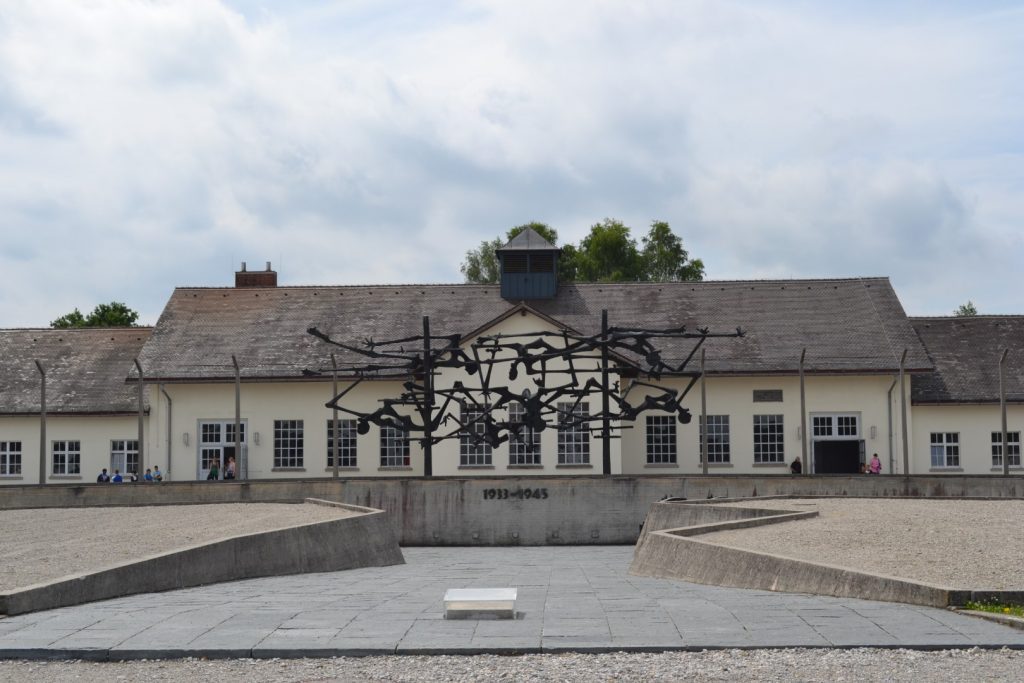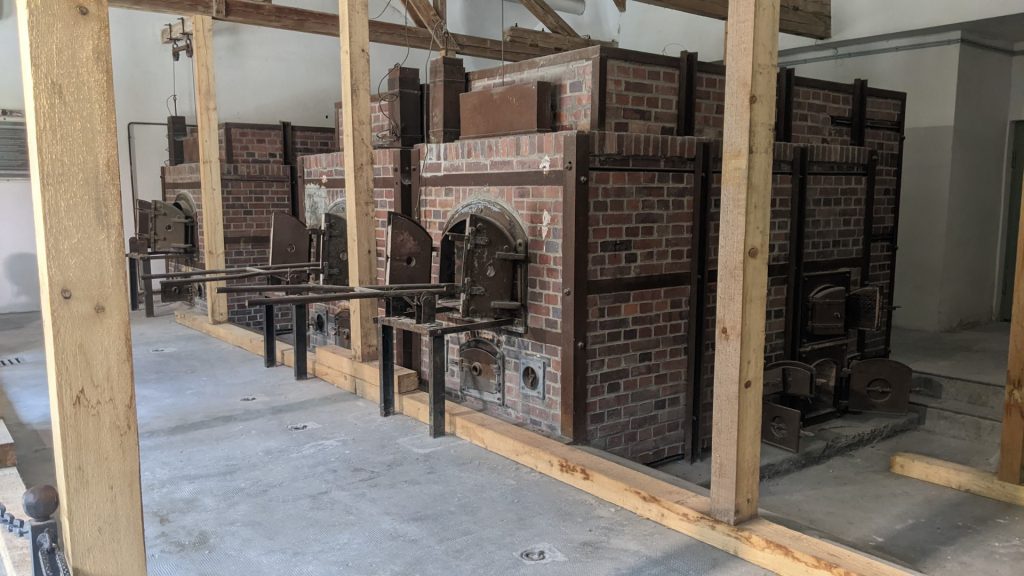This post may contain affiliate links where we earn a small commission. Please see our disclosure for more information and thank you for supporting our site so we can continue to bring you awesome content for your travel inspiration!]
I once heard a phrase along the lines of “If it could happen to children that young then a child that same age can learn about it today”
I actually heard this when I began introducing my (then 3 year old) son to racial topics in the USA. I often wondered if he was too young to be talking about some of the really hard to discuss topics I was trying to introduce and when I heard that (probably said more eloquently) phrase above, it really hit home to me. Whether it was a child born into slavery or a family taken to a concentration camp, CHILDREN experienced these tragedies. Did they have the luxury of “being too young?” No. They had to live it.
So, I think that same way of thinking that “If [insert whatever difficult topic/event/etc] could happen to children that young then a child that same age can learn about it today” can apply to the situation of taking kids to a concentration camp as well. Granted, it’s not THAT straight forward, so let’s dive in.
First, I want to set the stage for my answers below. I’ll start by saying that this is not the typical article that I put out here on WIG. Rarely will I deep dive into politics, or even give an opinion (ok, that last part is a bit of a lie- I give PLENTY of opinions on things like What Hotels Are Best Near Neuschwanstein, why I’m totally and completely biased about visiting the underrated Gem of Regensburg and I will fight anyone that says that Nutella doesn’t go on a German pretzel!!!) But I think you get my point. But here is why I think that my opinion semi- matters on THIS particular topic.
I Used To Be An Elementary Grade School Teacher: I only throw this around to simply state that, while I am by no stretch of the imagination, an expert when it comes to kids, I have also spent a great deal of my adult life working with children, including a degree in the area.
I’m a Mom: I have a VEEEERY inquisitive 6 year old kiddo (and 4 year old as well as baby) but man does my son give me some seriously challenging topics of conversations to deal with. They started with topics about the Universe (he’s obsessed with space and swears he’ll be an astronaut). I’m talking like, deep “Who are we, what is the meaning of life” kinda stuff that makes my eyes bug out because how the heck to do I answer that!?
But living in Germany, he sees things like the “Stolpersteine” which are these small, gold “stepping stones” seen all throughout Germany. They are typically laid in front of the homes of people who were murdered during the Holocaust. Try having a conversation about Nazis and the Holocaust with a 4 year old who is living in Germany….it’s tough to navigate and not stumble yourself! But, I’ve been there, so I truly do think these topics are possible, even with young ones.
Also, while I haven’t been to a Holocaust site in a while with the kids (Covid mostly related), we did take that same little boy to Auschwitz with us when he was just a baby.
The First Time I Visited Dachau I Was Only 14: Before ever moving to Germany myself, my family went on a huge trip to visit Germany. Naturally, one of our Day Trips from Munich was to the Dachau Concentration Camp. My knowledge of World War II didn’t extend too far beyond what we read in the Anne Frank Diaries in 8th grade, so to say I was shocked, mortified, and the memory of Dachau was forever imprinted on me is an understatement. So, I can also attest to the importance of being shown something like Dachau as a teen because I experienced that myself as well.
I have Been To Many Holocaust Sites in Europe: I have been to Dachau alone 4 times, the most recent being just last week. I’ve been to Auschwitz with a baby. I’ve toured the Nazi Rally Grounds in Nuremberg, and more. I think it is an important history lesson to keep at the forefront of our minds and each location offers a different perspective or lesson and a new opportunity to show your respect to the atrocities that happened in the place your are vacationing.
So, all that to basically say that I am by far an expert on these topics. But it is to say that I’ve actually been in the situation from several different angles, each one offering me a slightly different perspective on the touchy topic. If you are here because you Googled, “Should I take my kids on a concentration camp tour?” then hopefully these explanations can help you make your decision.
You Might Also Be Interested in Reading:
- Everything You Need To Know About Visiting Dachau
- How to Get from Munich to Dachau
- Your Complete Guide to Visiting Germany With Kids
What Ages are Appropriate For Visiting a Concentration Camp?

To be completely honest, I think that all ages, from babies, to 8 year olds, to young teens can (and arguably should) visit Auschwitz, Dachau, Sachsenhausen, etc. Granted, I think that each age range needs to be approached and prepped much differently from the next and that you shouldn’t just waltz right into one. More on that below.
Why Should Kids Visit Concentration Camps
They are Impressionable
One might see that as a positive or a negative in this regard. However, I choose to see it as a positive. What a time in a young person’s life to teach such an invaluable lesson about the important topics of
- Accepting everyone for who they are, despite where they come from, what they look like, what color skin they are, who they love, etc. Tolerance is an incredibly important skill to internalize, no matter the age
- Standing up for marginalized groups even when it is hard
- Seeing what people are capable of and learning how to build a world that it won’t/can’t happen again
Teens especially are so impressionable. I know for me, at just 14 years old, visiting Dachau was something I would never forget. That one visit to a concentration camp as a teen truly transformed a lot of my world beliefs, my views on compassion, tolerance, and so much more.
Almost Anything Can Be Taught In an Age Appropriate Manner
When I used to teach grade school, I actually got a certification to teach elementary Montessori. One of the beliefs about that pedagogy is that children are SO much more capable than what we give them credit for. Not only can they grasp way more than what we might think they can, but when offered in a completely AGE APPROPRIATE manner, young children can really benefit from learning about difficult (both intellectually speaking AND emotionally) topics.
For me, it is often hard to keep emotions (and opinions) under control. However, use this time to really just focus on facts. With my young son, I started out very slowly, with overly basic explanations (“War is when two groups of people don’t agree on something and it turns into people fighting”) and then let him take the lead. In this case, he asked me about bombs. I “simply” explained that some bombs usually destroy buildings, roads, bridges, etc. I leave out the fact that they are often used to kill people from the other side.
However, since we are living in Germany, when it was time to dive a bit deeper into World War II itself, we strongly avoided phrases like “The Germans were the bad guys.” Instead, we would say things like “There was a group of people in Germany that didn’t think that everyone should be treated equally.” We would say things like, “There was a leader of a group of people, called the Nazis. His name was Hitler, and they thought that some people, like Jewish people, shouldn’t get to have all the same things he wanted to have himself.” Again, for older kids, you obviously don’t need to have that basic of explanations, but you hopefully get the point.
Tips on Visiting Dachau With Kids (And other German Concentration Camps)

Depending on the Age, They May Not Even Understand- and that is fine
If you are going with kids under 10, chances are, they may not even know what all they are seeing. For example, the barracks at Dachau may just look like a long room with bunk beds in them. At Auschwitz, many buildings may just look like brick buildings to a child. So, instead of focusing on the details, it’s ok to just let them see it as they see it, which very well may just be an open field, or statues, etc.
Tip: Before going to a concentration camp/ memorial, you should read up to see if there are any specific areas that you should avoid for kids under a certain age- I’ll go over some below specifically for Dachau.
Prepare Them Ahead of Time
No matter what age your kids are, if you are going to a concentration camp, begin a few months ahead of your trip talking about some basics of history. You can begin by telling them that part of going to Germany is because you get to learn all about other cultures, way of life, etc. Start with simple things, like different foods to try in Germany that kids will love. Maybe even look at different Trachten (Lederhosen and Dirndls). You can even find a fest that would be a ton of fun for the whole family.
But then ease into World War II. Even recently for us, we hosted a family escaping the war in Ukraine, so before they arrived, we sat down and talked to both the boys about what war is. Before going to a place like a concentration camp with kids, think about what level of knowledge they should have before being thrown into the situation.
If they asked us about things like “Why” we use phrases as “Well some people think…..”
For older kids and teens, let them know that they may see some images and things that might disturb them. Let them know that they can ask you any questions. You can also get into more of the tolerance discussions as they will be able to grasp that more. They are probably very capable of understanding the genocide by this time. Use this as an opportunity to explain the importance of going to places like Dachau so that we, as individuals, can work together to prevent future hate groups.
Important: Give This The Time It Deserves
ESPECIALLY if a child has come to YOU to talk, inquire, and ask about something (maybe it was something they heard at school, overheard on the radio in the car, etc) give the topic plenty of time. Don’t rush it. We all have dinner to make after a long day of work/school, a million things on our to do list, and are probably rushing out the door to this soccer game and that violin lesson. If you don’t have time RIGHT NOW, acknowledge that you understand they really want to talk. Find a time (in the very near future so that they don’t go exploring on their own for answers in the meantime) where you can both sit down, sit eye to eye, and have a good conversation.
Meet Them At Their Level
This is just a reinforcement of my above statement that anything can be taught at any age, but within the limits of where they are at emotionally, developmentally, and intellectually. Again, This is going to vary widely depending on the age of your child and only YOU know what topics they can handle. For my son, at just 6 years old, he is still grasping what the concept of war even is.
With my 4 and 6 year old, I am NOT going to be talking about gas chambers or families ripped apart. But following HIS lead, if he asks further questions, such as “What did they have to do at the labor camp” (and “What is a labor camp….what is labor….”) I will say, things like “They were forced to work very very hard out in the blazing sun and in the freezing cold.” When he flat out has asked me if people died, I tell him the truth. Yes, people die in wars. But again, leaving it at that and therefore leaving out the gruesome details. (But also, at his age reinforcing that he is safe right now)
For kids around 10, some may be able to handle very beginning talks about death and the costs of war. Others may not. YOU know your child. At this age, start introducing more vocabulary, while still using basic explanations for descriptions.
For teens, most have been exposed to some sort of educational material in school, whether it be reading The Diary of Anne Frank, or even having the topic in a World History Class. So it is less about preparing them for what they are going to see and more about preparing them for how to process what they are going to see (because at THIS age, they most likely WILL grasp the magnitude of what they see and read at the concentration camp, but may not have the skills to know what to do with it yet.)
Ask Them How They Feel About It
Sometimes when they ask heavy questions like “Why would someone do that?” I ask them back, “Well, why do YOU think?” or I may give an (age appropriate) answer such as, “Well, there was a group of people who didn’t believe that everyone, despite the color of their skin or religion, or other things that made them “different” was equal and deserved all the same things….what do you feel about that?”
I know it all sounds very “Psychiatry-eque” with the “Tell me how you feel about that….” But it can be VERY telling in what they are able to truly understand by their answers. I’m often blown away by my son’s responses. This often guides ME in knowing what I either need to “dumb down,” explain further, clarify, or even spend time working on even in our daily lives (such as looking for ways to learn about groups of people who are “different” from us and always looking for ways to point out why these differences make us all unique and wonderful)
At the Concentration Camp
Go Over Rules and Expectations For Visiting
This is VERY, VERY important, especially if you’ve got rough and tumble young boys that love to play “Ninja” no matter where they are at or if you’ve got a group of teens that love to laugh, giggle, and joke around.
Set very clear expectations before going in. This is a place of RESPECT, not play and fun. Again- you can adjust these rules for age appropriateness
- This is a place of QUIET- there will be no running around, no goofing around, no loud talking…..and NO Ninja moves
- No Selfies (for the teens): I was pretty ticked off when I saw some young girls taking selfies at Dachau. I mean, seriously!
- No Food: I know, I know, it’s a parents’ number 1 trick to success. (Load up on snacks before entering!) but it is a rule, at least at Dachau
- No Touching Exhibits: I know it is hard (for younger) but today, we are going to keep our hands to ourselves
When I visited Auschwitz, my son was about 7 months old. Obviously, I can’t sit a baby down and say, “Ok Baby, this is a place of quiet, please no crying and yelling today.” So, it was more on ME as the parent to be aware and respectful. I love to babywear (my preferred choice is the Tula) and luckily, my babies are pretty chill if snuggled into one of those. However, there have been times that as they got to the Toddler phase (and not as complacent in just hanging out in the Tula), like the time we were visiting the 9/11 Memorial Museum. I did not want to be a distraction to others or disrespectful, so I ultimately had to end up skipping about half of the museum because he just wasn’t having it. You may have to do the same.
Talk With Them About It
From an educator’s stand point, I think this is one of the most important parts of the learning cycle, and one that is often missed with parents.
Gauge your child and decide if you want to talk to them about what you are encountering while you are actually there at the concentration camp or, alternatively, you can decide to let them process and soak it in themselves (each child will interpret things or understand things at different depths depending on age, background information, etc) and then talk about it after. Over dinner or even on the train ride back to Munich could be good times to process this together. Again, keeping language and concepts age appropriate.
Find a Tour Guide
In my Visiting Dachau Guide, I actually say how I don’t think having a tour guide is worth it for Dachau. HOWEVER, I’ll make a big caveat here and say that finding a private tour guide may actually be a decent idea if going to Dachau with kids (or other concentration camps). A well vetted, private guide will know the memorials very well and therefore will be able to guide you away from areas that may not be suitable for certain age ranges (while still giving you, the parents, the information you deserve to hear and learn about as well)
What To Avoid When Taking Kids to a Concentration Camp

Each Concentration Camp/ Memorial site is going to be different. However, since WanderInGermany is a Germany Travel Blog, I’ll just speak to what I know here. My point is that before going, make sure you have looked up that particular location and see if there are specific areas that your kids (based on their ages) should not tour.
Almost all of the concentration camps/ memorial sites will have some sort of visitor center. I highly recommend going into that first and directly asking the staff what areas of the site you should avoid for the age of kids you have with you.
Dachau: I’ve been asked, “Is Dachau appropriate for children?”
The memorial site itself says that kids under 12 should avoid certain areas and parents should be particularly mindful with this age as it is all not obviously suitable for kids. But I don’t think that means you should avoid the entire site either if you have kids under 12.
- Exhibition Building: This museum is pretty vital in my opinion but wow, are there some images and videos that are gruesomely hard to take in even for adults. We are talking photos that still haunt ME and are ingrained in my own memory. It’s obvious why kids shouldn’t be viewing it themselves. Therefore, while it may not be ideal and you will probably have to skip some of the exhibition (I easily recommend at least an hour for this building alone) try taking turns if you are there with a partner. Have the kids go to the cafe at the visitor center while one adult quickly does the museum and then switch.
- Crematoriums: The other difficult to stomach location at Dachau is the crematoriums. Granted, very young kids may not even know what they are looking at, and it’s easy enough to keep them far enough away while the other parent/adults goes in, I wouldn’t take even my 6 year old (who would be asking way too many questions that I simply wouldn’t know how to appropriately answer for him).
So, Should I Take My Kids On A Concentration Camp Tour
Yes. But tread lightly. I’m sure I am a broken record by this point, but decide what is developmentally and age appropriate for your specific child and approach it delicately. However, when done correctly, I think that children of all ages can learn from the experiences of visiting a concentration camp.
In fact, ALL school aged children in Germany are REQUIRED to go to a Holocaust site during their schooling. Most of the time, this is to a concentration camp and it is during their teen years. This just goes to show how important it is for even Germans to keep this part of history from slipping too far away in the text books, but instead to stay at the forefront of learning to learn from past mistakes.
Books To Read Before Going to a Concentration Camp With Kids
Whether you have younger kids and want to read a few books to help introduce some topics or if you’ve got teens, here are some books to help you start some conversations. For the chapter books, most of them also have audiobooks available as well, making them great options to have on your flight over as well for you kid.
Young Children/ Board Books
I am Anne Frank: by Brad Meltzer. Illustrated by Christopher Eliopoulos
I Will Come Back For You: A family Hiding During World War II: by Marisabina Russo
Young Teens
Another way to approach it is to tell you child that you want to learn more about where you are going on your trip as well and invite them do read the book with you each night (either you both reading it individually if they are older) or you reading a few chapters each night (almost like a bedtime routine, like when they were younger). That way, you can still guide a conversation around the topics being presented.
Anne Frank: The Diary of a Young Girl: by Anne Frank
Hana’s Suitcase: The Quest to Solve a Holocaust Mystery: By Karen Levine
Hana’s Suitcase: The Quest to Solve a Holocaust Mystery: by Karen Levine
‘MAUS’ : by Art Speigelman
The Devil’s Arithmetic: by Jane Yolen
Number the Stars: by Lois Lowry
















